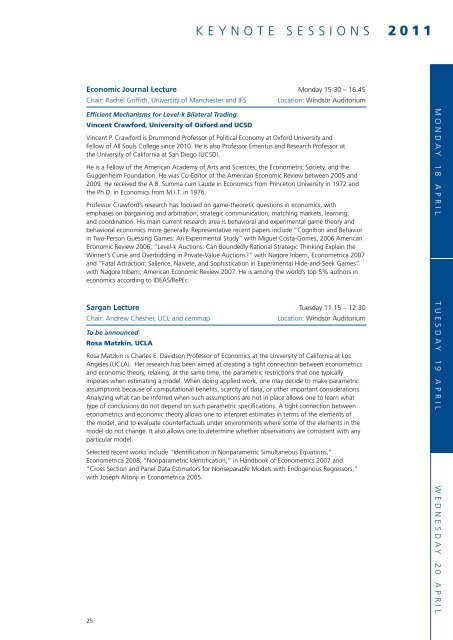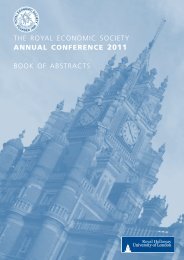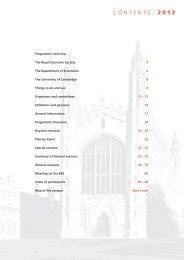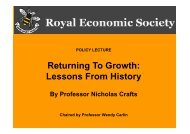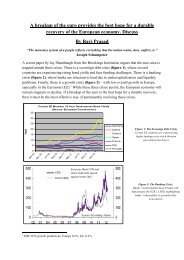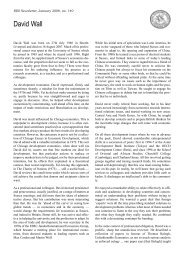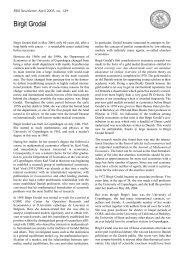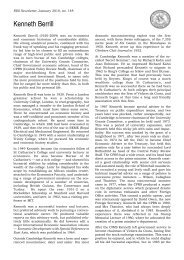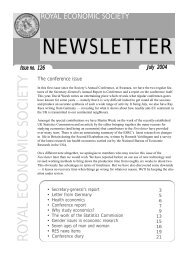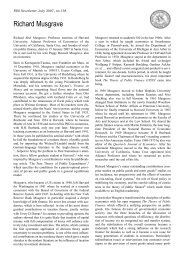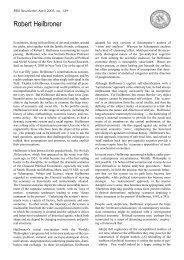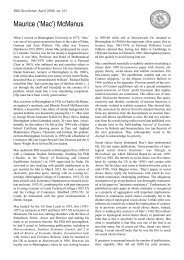High quality papers on theoretical, empirical and applied topics ...
High quality papers on theoretical, empirical and applied topics ...
High quality papers on theoretical, empirical and applied topics ...
You also want an ePaper? Increase the reach of your titles
YUMPU automatically turns print PDFs into web optimized ePapers that Google loves.
25<br />
k e y n o t e s e s s i o n s 2011<br />
Ec<strong>on</strong>omic Journal Lecture M<strong>on</strong>day 15.30 – 16.45<br />
Chair: Rachel Griffith, University of Manchester <strong>and</strong> IFS Locati<strong>on</strong>: Windsor Auditorium<br />
Efficient Mechanisms for Level-k Bilateral Trading:<br />
Vincent Crawford, University of Oxford <strong>and</strong> UCSD<br />
Vincent P. Crawford is Drumm<strong>on</strong>d Professor of Political Ec<strong>on</strong>omy at Oxford University <strong>and</strong><br />
Fellow of All Souls College since 2010. He is also Professor Emeritus <strong>and</strong> Research Professor at<br />
the University of California at San Diego (UCSD).<br />
He is a Fellow of the American Academy of Arts <strong>and</strong> Sciences, the Ec<strong>on</strong>ometric Society, <strong>and</strong> the<br />
Guggenheim Foundati<strong>on</strong>. He was Co-Editor of the American Ec<strong>on</strong>omic Review between 2005 <strong>and</strong><br />
2009. He received the A.B. Summa cum Laude in Ec<strong>on</strong>omics from Princet<strong>on</strong> University in 1972 <strong>and</strong><br />
the Ph.D. in Ec<strong>on</strong>omics from M.I.T. in 1976.<br />
Professor Crawford’s research has focused <strong>on</strong> game-theoretic questi<strong>on</strong>s in ec<strong>on</strong>omics, with<br />
emphases <strong>on</strong> bargaining <strong>and</strong> arbitrati<strong>on</strong>, strategic communicati<strong>on</strong>, matching markets, learning,<br />
<strong>and</strong> coordinati<strong>on</strong>. His main current research area is behavioral <strong>and</strong> experimental game theory <strong>and</strong><br />
behavioral ec<strong>on</strong>omics more generally. Representative recent <str<strong>on</strong>g>papers</str<strong>on</strong>g> include “Cogniti<strong>on</strong> <strong>and</strong> Behavior<br />
in Two-Pers<strong>on</strong> Guessing Games: An Experimental Study” with Miguel Costa-Gomes, 2006 American<br />
Ec<strong>on</strong>omic Review 2006; “Level-k Aucti<strong>on</strong>s: Can Boundedly Rati<strong>on</strong>al Strategic Thinking Explain the<br />
Winner’s Curse <strong>and</strong> Overbidding in Private-Value Aucti<strong>on</strong>s?” with Nagore Iriberri, Ec<strong>on</strong>ometrica 2007<br />
<strong>and</strong> “Fatal Attracti<strong>on</strong>: Salience, Naivete, <strong>and</strong> Sophisticati<strong>on</strong> in Experimental Hide-<strong>and</strong>-Seek Games”<br />
with Nagore Iriberri, American Ec<strong>on</strong>omic Review 2007. He is am<strong>on</strong>g the world’s top 5% authors in<br />
ec<strong>on</strong>omics according to IDEAS/RePEc.<br />
Sargan Lecture Tuesday 11.15 – 12.30<br />
Chair: Andrew Chesher, UCL <strong>and</strong> cemmap Locati<strong>on</strong>: Windsor Auditorium<br />
To be announced<br />
Rosa Matzkin, UCLA<br />
Rosa Matzkin is Charles E. Davids<strong>on</strong> Professor of Ec<strong>on</strong>omics at the University of California at Los<br />
Angeles (UCLA). Her research has been aimed at creating a tight c<strong>on</strong>necti<strong>on</strong> between ec<strong>on</strong>ometrics<br />
<strong>and</strong> ec<strong>on</strong>omic theory, relaxing, at the same time, the parametric restricti<strong>on</strong>s that <strong>on</strong>e typically<br />
imposes when estimating a model. When doing <strong>applied</strong> work, <strong>on</strong>e may decide to make parametric<br />
assumpti<strong>on</strong>s because of computati<strong>on</strong>al benefits, scarcity of data, or other important c<strong>on</strong>siderati<strong>on</strong>s.<br />
Analyzing what can be inferred when such assumpti<strong>on</strong>s are not in place allows <strong>on</strong>e to learn what<br />
type of c<strong>on</strong>clusi<strong>on</strong>s do not depend <strong>on</strong> such parametric specificati<strong>on</strong>s. A tight c<strong>on</strong>necti<strong>on</strong> between<br />
ec<strong>on</strong>ometrics <strong>and</strong> ec<strong>on</strong>omic theory allows <strong>on</strong>e to interpret estimates in terms of the elements of<br />
the model, <strong>and</strong> to evaluate counterfactuals under envir<strong>on</strong>ments where some of the elements in the<br />
model do not change. It also allows <strong>on</strong>e to determine whether observati<strong>on</strong>s are c<strong>on</strong>sistent with any<br />
particular model.<br />
Selected recent works include “Identificati<strong>on</strong> in N<strong>on</strong>parametric Simultaneous Equati<strong>on</strong>s,”<br />
Ec<strong>on</strong>ometrica 2008; “N<strong>on</strong>parametric Identificati<strong>on</strong>,” in H<strong>and</strong>book of Ec<strong>on</strong>ometrics 2007 <strong>and</strong><br />
“Cross Secti<strong>on</strong> <strong>and</strong> Panel Data Estimators for N<strong>on</strong>separable Models with Endogenous Regressors,”<br />
with Joseph Alt<strong>on</strong>ji in Ec<strong>on</strong>ometrica 2005.<br />
m o n d a y 1 8 a p r i l t u e s d a y 1 9 a p r i l w e d n e s d a y 2 0 a p r i l


